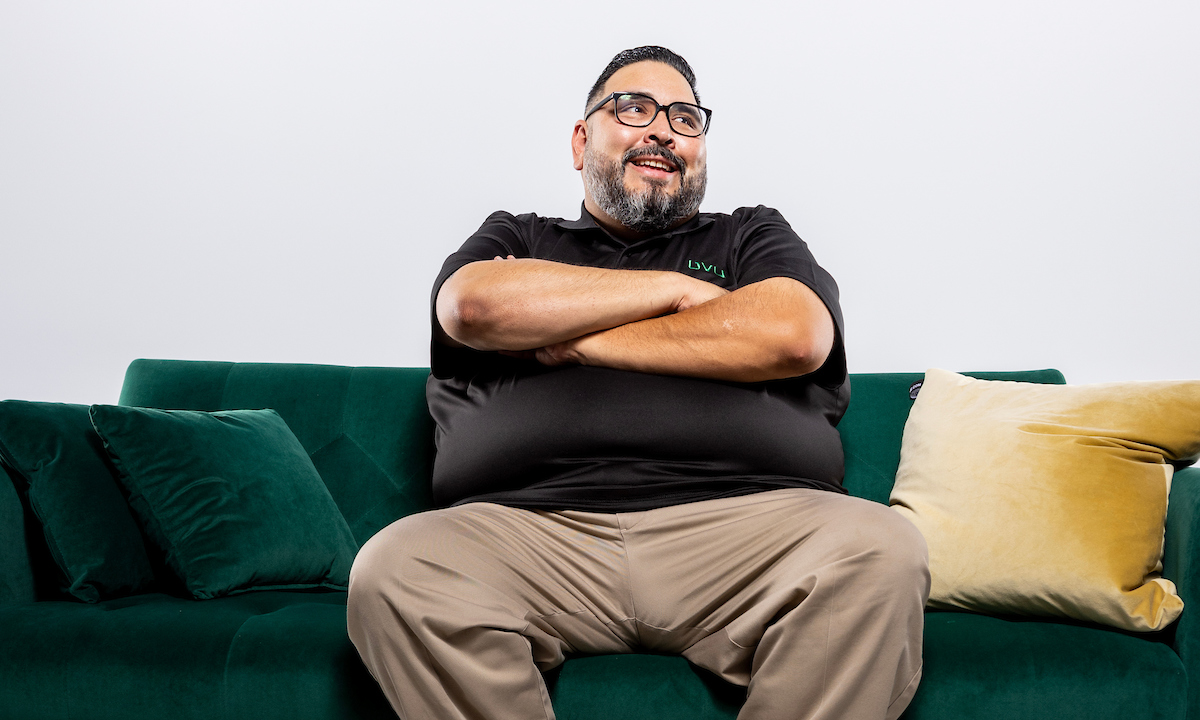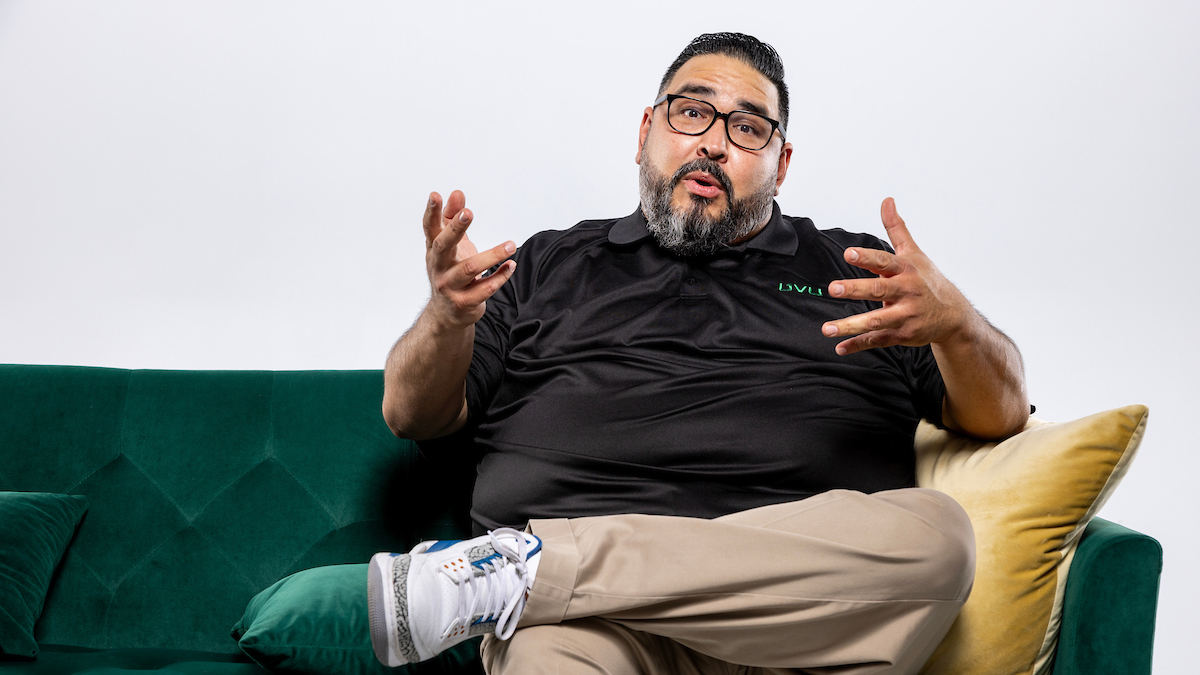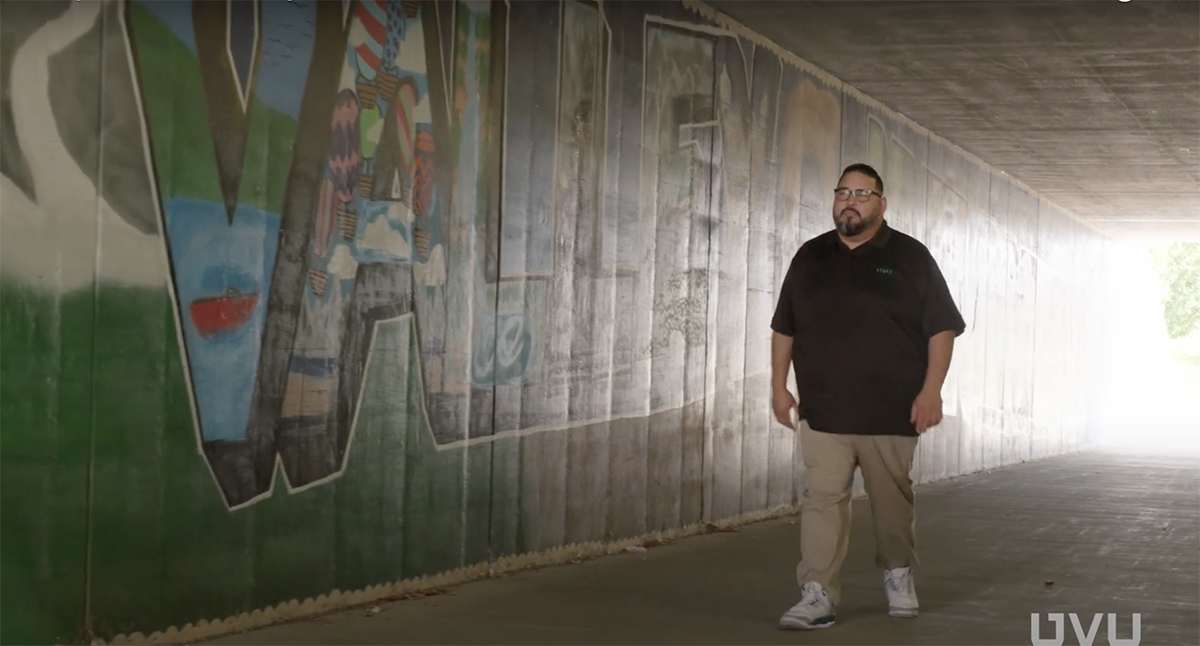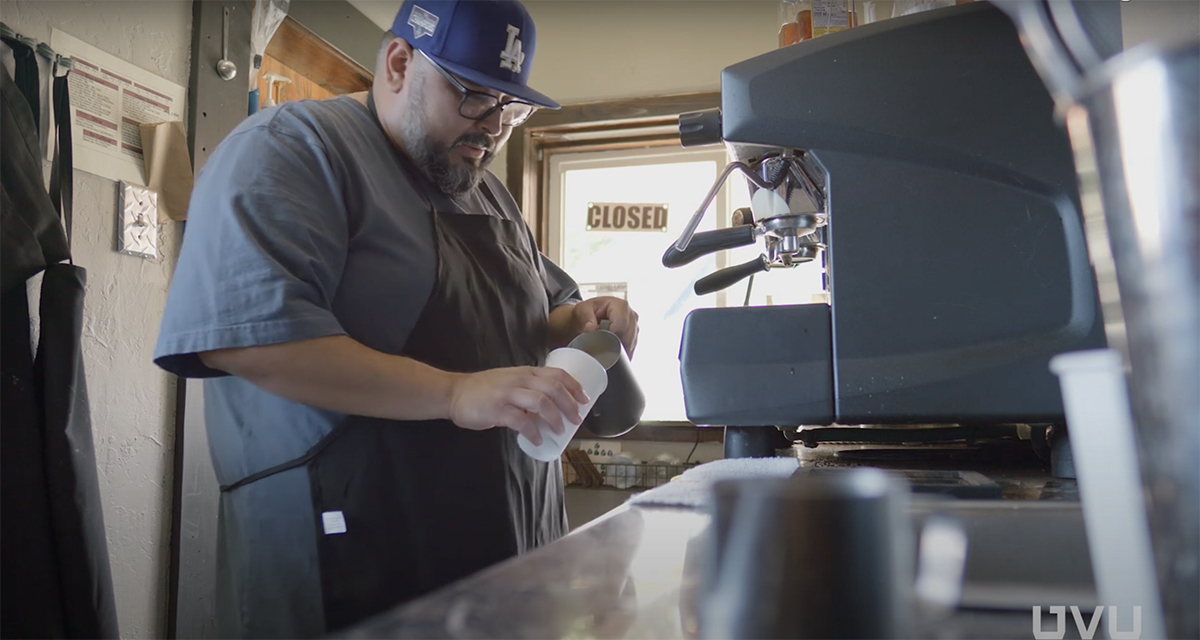As told by David Nelson
UVU is a place that will get you to where you need to be in life. Everyone here is genuine. They want what's best for you.

Photo by Kennedy Evans

I grew up in Los Angeles (LA) in a gang-infested neighborhood. We moved to Cypress Park [in] northeast LA when I was in first grade. I remember the first week being home. We're having a little barbecue on our porch and heard gunshots. Right off the bat, gunshots. That was our first introduction to Cypress Park — welcome home.
I remember I was in first grade, walking home from school, [and] I got approached by some older individuals asking me where I was from. I didn't really know what they were talking about. They were older guys involved with gangs. I didn't know any better, so I kind of befriended them and started hanging out with them. I really thought that the gang lifestyle was like a normal thing. We would tag buildings, and there were a lot of shootings — a lot of killings.
We used to talk about what jail you wanted to go to instead of what college. Education was kind of just there; it wasn't something that I wanted to do. I didn't even think about finishing high school. I was just living and just messing around.
I gained a reputation [from] fighting. I was known within the community, and I had a lot of rivals who were guys that we grew up with but joined separate groups so we had issues. [In] 11th grade, I skipped class for a whole month, so my high school dropped me. But my younger siblings were attending Renaissance Arts Academy, a new charter school, and the director let me in.
When I went to Renaissance, I wanted to change. But sure enough, people still knew who I was. Things started catching up to me as a young adult. I wanted to get an education and be a teacher. But I was still in the same community that I had not been a great citizen in. I was able to finish school, but I didn’t escape the fighting and the tagging. Eventually, I knew that if I stayed in LA, I [wouldn’t] be able to pursue an education. I probably would end up dead or in jail.
My mom lived in Utah, and I decided to move out there. It was a hard decision. I was leaving my whole life behind, but I did it.

I was a little nervous when I was going to register for UVU because I was not a non-resident at the time. But I got residency through my mom because she had already been living here, so I registered. There was a club called the Latin American Club, and Kyle Reyes was the advisor. Yasmine Montero was helping recruit students, and I got recruited into it.
I started getting involved with the university and in the Multicultural Center. Dr. Brett Breton was one of the Multicultural Center advisors, and he was from LA; Kyle Reyes was from LA; Axel Ramirez [was from LA]. I thought, “Man, these guys did it. I could do it. These guys are from around where I grew up, and they're doing things for the community and the students. I want to be like them.”
I don’t think these people really knew what they were doing for me. I was a struggling [and] trying to find myself as this 22-year-old trying to do good. I didn't have any role models to open up the world of education for me at the time. I didn't know how to navigate higher education or my life.
I got my first job at Dixon Middle School. I was a student advocate for English language development or ESL students. This was really providing students with the support that they needed to develop the English language. Some students were just learning English, and others were past that, but even though a student is proficient, you still have to work with them for a couple of years and make sure everything's good. I had to go into the classrooms and help them with their work. I had a center where I’d bring them in [and] we’d do homework together. For me, it was a good thing to be able to connect with the students, and I had awesome coworkers.
I remember one day, a close coworker sat me down, and she asked me a question. “You know what you're doing?” I was like, “Oh man, I'm in trouble.” She told me, “You have a gift. You work well with students. Students come to you, and you make a difference.” And I remember I started to cry because no one had ever pointed that out to me.

When I was in third grade, my grandpa had a big backyard full of coffee trees, I didn’t know [about coffee cherries]. So, I started picking the cherries, throwing them in a bucket, and we would throw them up on the roof and let them dry. It's called the natural process. Let them dry for a couple of weeks, and then get a two-by-four and take out the seed of the coffee, let it chill for a little bit, and roast them in the cast iron pan on the stove. We didn't have a grinder, so we just used a rock to grind the coffee.
Coffee has always been part of my life, and I think that's the nostalgia about it. My dad no longer lives, my grandma no longer lives, my grandpa no longer lives. But I was able to experience coffee with them. I would drink it with them [and] do the whole process with both my grandpa and my dad. So, it kind of brings me back to that.
I remember moving back to California in 2019, and coffee shops were popping up. There were a lot of roasteries in the neighborhood where I grew up. And I thought to myself, “I can do this. I learned about coffee early on. I could run my own coffee business.” So, I bought a home roaster, and started roasting coffee at my house. I was working at UCLA, and I would take my colleagues samples of my coffee and they liked it. Then, I moved back to Utah in February of 2020. With my little roaster, I was able to get a couple of local bakeries to buy my coffee. I remember I got one order for 20 pounds, and for 10 hours nonstop, I was roasting. I got some bigger roasters and was able to do some bigger accounts.
I’ve always wanted a space for people like me (I’m Mexican American), and in Utah County, there’s no place to get a pan dulce and drink a coffee. I’m all about community, and I wanted a space where people can sit down and have a good time and students can do their homework. So, I opened a shop called Pueblo Coffee on Main in Springville, UT, in November 2022. We were honored to place number two in the Daily Herald’s Best of Utah Valley for coffee shops. That was a big accomplishment.
I just like connecting with the community here in Springville. My coffee journey has always been about connections, right? Connecting with people from different backgrounds. Pueblo means village, [it] means community. Sharing a cup of coffee, it’s like breaking bread. I wanted to build a community space where people could come together and drink coffee and break bread. I think Pueblo coffee on Main is becoming that. That's always been a goal of mine.
UVU is a place that will get you to where you need to be in life, like what happened to me right when I got here. All these opportunities opened up. I was able to connect with people. It’s a beautiful campus, man. Everyone here is genuine. They want what's best for you. They want to show you the world. They want to provide you with the access you need to succeed. Amazing, right?
Links:
Dr. Axel Ramirez
Dr. Brett Breton
Dr. Kyle Reyes
Renaissance Arts Academy
Pueblo Coffee Roasters
Best of Utah Valley — Daily Herald